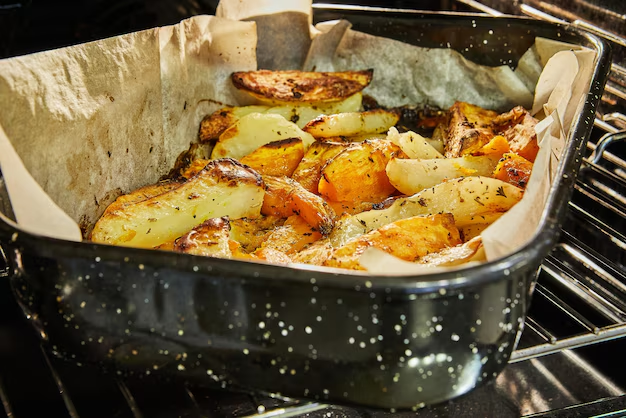How to Make the Most of Your Boiled Potatoes: Understanding Their Shelf Life in the Refrigerator
Boiled potatoes are a versatile and delicious addition to many meals, but what happens when you make more than you can eat? Understanding how long boiled potatoes last in the refrigerator can help you reduce food waste and ensure your meals remain safe and tasty. In this guide, we'll explore the shelf life of boiled potatoes, offer tips on storage, and delve into related subtopics to empower you with practical knowledge.
🥔 The Shelf Life of Boiled Potatoes
Boiled potatoes, like many cooked foods, have a limited shelf life when stored in the refrigerator. Generally, boiled potatoes can last up to four to five days in the fridge if they're stored properly. It's important to note that this is a general guideline and factors such as storage conditions and handling can influence their longevity.
Key Factors Affecting Shelf Life
- Storage Temperature: Potatoes should be stored at a consistent refrigeration temperature, ideally below 40°F (4°C), to slow down bacterial growth.
- Storage Method: Using an airtight container reduces exposure to air, which can cause spoilage and drying out.
- Initial Handling: Ensure potatoes are cooled quickly after boiling and stored in the refrigerator within two hours to minimize bacterial growth.
🥔 Tips for Proper Storage
Storing boiled potatoes effectively can help extend their shelf life and maintain their texture and flavor. Here are some tips:
Cool Them Quickly
After boiling, allow potatoes to cool to room temperature before refrigerating. Speed up this process by spreading them in a single layer on a baking sheet.
Use Airtight Containers
Store your cooled potatoes in an airtight container to protect against moisture loss and exposure to odors from other foods in the fridge.
Avoid Cross-Contamination
Keep potatoes away from raw meats and foods with strong odors. Cross-contamination with bacteria or transfer of flavors can diminish quality and safety.
Label and Date
It's easy to forget when you stored your boiled potatoes, so ensure you label the container with the storage date to keep track of freshness.
🍽️ Culinary Uses for Leftover Boiled Potatoes
Boiled potatoes left at the back of the fridge often end up forgotten. Let's explore a few creativity-inspiring uses to breathe new life into them!
Mash and Mix
Transform them into creamy mashed potatoes or potato salad by mashing or chopping and mixing with butter, herbs, or a light vinaigrette.
Perfectly Pan-Fried
Slice boiled potatoes and fry them in a bit of olive oil for a crispy take on a breakfast side or as a topping for salads and stews.
Savory Soup
Use boiled potatoes as the base for a hearty soup. Their starchiness contributes to a satisfying texture and flavor.
🥗 How Storage Mediums Change Shelf Life
Did you know that how you store your boiled potatoes can impact not only their shelf life but their flavor and texture too? There are several methods consumers might try.
Storing in Batches
Dividing potatoes into smaller portions can prevent them from absorbing excess moisture when stored in large volumes, which can cause spoilage.
Using Paper Towels
Paper towels placed in storage containers absorb condensation, which helps maintain potato texture by reducing moisture build-up.
Freezing for Longevity
Freezing extends the life of boiled potatoes significantly. Be sure to place them in freezer-safe bags or containers for optimum preservation.
❓ Why Do Boiled Potatoes Spoil?
Like all perishable foods, boiled potatoes are subject to decay. Proper understanding can broaden storage strategies:
Influence of Moisture Content
Potatoes naturally contain water, a medium that facilitates bacterial growth. Dry storage assists in extending their freshness.
Role of Starch
The starch in potatoes can break down over time, causing a change in texture and flavor if consumed too late.
Biochemical Reactions
Subtle chemical changes also contribute to spoilage. Refrigeration helps slow these processes, preserving the potato's natural state.
📋 Quick Storage & Shelf Life Checklist
Here's a quick checklist to ensure your boiled potatoes remain fresh and safe to eat:
- 🕒 Timely Storage: Refrigerate within two hours of boiling.
- 🌀 Temperature: Maintain a consistent temperature below 40°F (4°C).
- 📦 Airtight Containers: Minimize air exposure.
- 🚫 Cross-Contamination: Keep away from raw meats and pungent foods.
- 🗓️ Labeling: Keep track of storage dates.
🍲 Practical Storage Timeline
To wrap it all up, below is a simple table summarizing boiled potato storage guidelines for handy reference:
| Storage Method | Ideal Conditions | Shelf Life |
|---|---|---|
| Refrigerator | Below 40°F (4°C) | 4-5 days |
| Freezer | In freezer bags/containers | Up to 10-12 months |
| Room Temperature | (Not recommended) | Not applicable |
Final Thoughts
Knowing how long boiled potatoes last in the refrigerator is essential for making the most of your meals and ensuring household safety. By paying careful attention to storage methods, temperatures, and even creative culinary uses, you can enjoy this versatile vegetable time and time again without worry. It’s all about striking a balance between practicality and pleasure in the kitchen as you store, savor, and savor again, when it comes to those wonderfully tuberous boiled potatoes!

